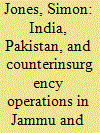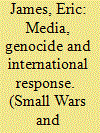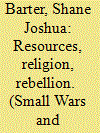|
|
|
Sort Order |
|
|
|
Items / Page
|
|
|
|
|
|
|
| Srl | Item |
| 1 |
ID:
080785


|
|
|
|
|
| Publication |
2008.
|
| Summary/Abstract |
With the ongoing conflict in Afghanistan a reliable ally to the South in Islamabad has rarely been as important for NATO countries as it is today. General Musharraf's porous borders and his difficulties controlling tribal minorities and religious radicals within his country bode ill for the future stability of the region. Tensions with India meanwhile remain, as do the nuclear arsenals aimed into the hearts of either country. If a nuclear war breaks out in the near future these two countries will likely be at its epicentre and it is therefore vital to understand precisely why hostilities exist between them. One of the major reasons is Kashmir. Understanding how both countries perceive the conflict in Kashmir is essential if one wishes to understand why they have gone to war so frequently in the past and why they might go to war in the future
|
|
|
|
|
|
|
|
|
|
|
|
|
|
|
|
| 2 |
ID:
080789


|
|
|
|
|
| Publication |
2008.
|
| Summary/Abstract |
This analytical article asks the question: to what degree did the media contribute to the Rwandan genocide and what might have been done about it? In examining the historical development of mass media in Rwanda, this paper argues that while hate media clearly contributed to the dynamics that led to genocide, its role should not be overstated. While it is commonly believed that hate media was a major cause of the genocide, instead it was a part of a larger social process. The use of violent discourse was at least as important as, for example, the availability of weapons in carrying out the genocide. Put another way, violent discourse was necessary but not sufficient by itself to cause the genocide of 1994. In arguing this thesis, Rwandan history is examined to demonstrate the processes of communication in the formation of destructive attitudes and behaviour. Next, analysis of the methods and content of propaganda campaigns is discussed. Finally, an overview of the requirements and organizations for third parties to conduct international communication interventions is presented in the last section
|
|
|
|
|
|
|
|
|
|
|
|
|
|
|
|
| 3 |
ID:
080790


|
|
|
|
|
| Publication |
2008.
|
| Summary/Abstract |
Today there are many calls for other elements of the government to do more to 'do their part', assist the military to restore order and stability and 'win the peace' in Iraq and Afghanistan, and prepare for similar roles in future conflicts. The authors here instead briefly review the history of US armed forces' involvement in military governance operations from the Mexican War through World War II, and recommend the re-establishment of a School of Military Government similar to that created during the latter conflict
|
|
|
|
|
|
|
|
|
|
|
|
|
|
|
|
| 4 |
ID:
080787


|
|
|
|
|
| Publication |
2008.
|
| Summary/Abstract |
A clear understanding of what creates a conflict is central to building a lasting peace. This paper targets two common misconceptions which cloud analyses of the recent separatist conflict in Aceh. First, the conflict was not about oil. Resource curse theories help explain the creation of the Free Aceh Movement (GAM), but cannot explain why the conflict remained limited for several years. The lessons here are that what motivates a conflict varies over time and across groups. Second, despite Acehnese history, identity, and global trends, the conflict was not marked by Islam. Instead, the GAM promoted ethnic nationalism and downplayed religion to sustain the conflict and their control of it. The lesson here is how leaders can shape, but cannot determine the identity of movements. Beyond these two misconceptions, I move towards explaining the causal mechanisms of the Aceh conflict and assessing this model in light of post-Tsunami developments
|
|
|
|
|
|
|
|
|
|
|
|
|
|
|
|
| 5 |
ID:
080788


|
|
|
|
|
| Publication |
2008.
|
| Summary/Abstract |
From 1964 to 1975 a small group of British officers, advisors, and trainers guided the forces of the Sultanate of Oman to victory in their conflict with the Marxist insurgents of the People's Front for the Liberation of the Occupied Arabian Gulf (PFLOAG). This campaign provides a clear example of how to effectively support an ally's counterinsurgency efforts with a minimal commitment of men and material. In particular, the critical assistance provided by the British consisted of experienced leadership and skilled technical support personnel as well as a viable strategy for victory. However, more important for the ultimate success of the counterinsurgency campaign was the emergence of new progressive leadership with the accession of Sultan Qaboos. The most important lesson from this study is that while security assistance can reinforce positive political efforts, it is not enough on its own to bring about a victory in an unfavourable political environment
|
|
|
|
|
|
|
|
|
|
|
|
|
|
|
|
| 6 |
ID:
080786


|
|
|
|
|
| Publication |
2008.
|
| Summary/Abstract |
The classical repertoire of insurgency types is under-specified, and does not apply well to the case of Pakistan's conduct of insurgency in Kashmir. Pakistan's approach to insurgency has been a consistent tribal variant of focoism, in which there is a reliance on imported itinerant insurgents to conduct raids to stimulate an uprising. This has its basis in the traditional warfare of the region, learned US insurgency doctrine in the 1960s, and an historical disregard for subject populations, which has led to an aversion to fostering grass-roots political movements
|
|
|
|
|
|
|
|
|
|
|
|
|
|
|
|
|
|
|
|
|